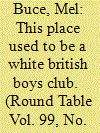| Srl | Item |
| 1 |
ID:
158482


|
|
|
|
|
| Summary/Abstract |
Two decades after the ‘third wave of democratization’, extensive violence continues to follow elections in sub-Saharan Africa. Whereas national processes connected to pre-election violence have received increased scholarly attention, little is known of local dynamics of violence after elections. This article examines the 2011 Nigerian post-election violence with regard to the ways in which national electoral processes interweave with local social and political disputes. The most affected state, Kaduna State, has a history of violent local relations connected to which group should control politics and the state. It is argued that electoral polarisation aggravated national ethno-religious divisions that corresponded to the dividing line of the conflict in Kaduna. A rapid escalation of violence was facilitated by local social networks nurtured by ethno-religious grievances.
|
|
|
|
|
|
|
|
|
|
|
|
|
|
|
|
| 2 |
ID:
129048


|
|
|
|
|
| Publication |
2014.
|
| Summary/Abstract |
Current research suggests that negotiations which are more inclusive are more likely to achieve durable peace since they speak to the entire population. One way to ensure public support is through the inclusion of civil society groups, either directly at the negotiation table or indirectly in supportive roles. It is argued that through their inclusion there is a positive effect on the legitimacy of negotiations which in turn leads to more durable peace. Nonetheless, the reasons why and how involving civil society groups improves the legitimacy of negotiations remains little understood. This article considers the gap in research by using original empirical data to look at the peace negotiations held in Liberia in 2003 and Kenya in early 2008. A theoretical model of legitimate negotiations will be used to show in what ways the involvement of civil society groups can in fact make the conduct of negotiations and the outcome of an agreement more legitimate for the aggrieved population.
|
|
|
|
|
|
|
|
|
|
|
|
|
|
|
|
| 3 |
ID:
168554


|
|
|
|
|
| Summary/Abstract |
Research on international election observation shows that observation reduces fraud, encourages participation, and boosts confidence in the election. However, this conventional account misses the negative, violence-inducing potential of observer criticism. This is the first study examining how observer criticism influences post-election violence. Democracy depends on the loser’s consent, and the willingness of election losers to be governed by the winners can be influenced by observer criticism. When reputable observers criticize the credibility of an election, they can encourage losers to challenge the result. Observer criticism strengthens the electoral loser by legitimizing a challenge and serving as a focal point for mobilization. Using data on post-election violence in thirty-eight countries in sub-Saharan Africa since 1990, I show that internationally condemned elections are more likely to turn violent than not-condemned elections. These results are robust to various control variables (including observer presence and election fraud) and accounting for potential selection, spuriousness, endogeneity, and omitted variables.
|
|
|
|
|
|
|
|
|
|
|
|
|
|
|
|
| 4 |
ID:
099750


|
|
|